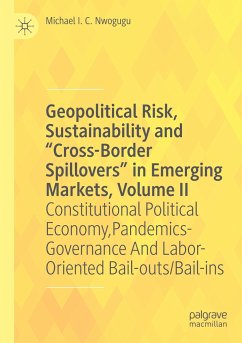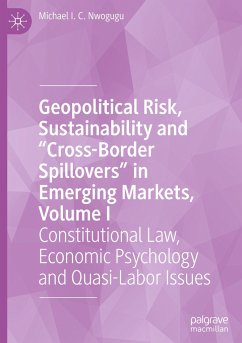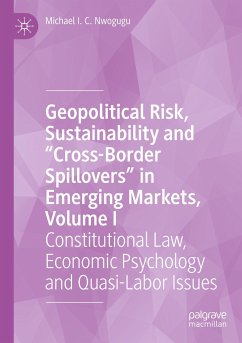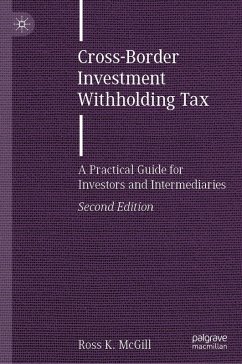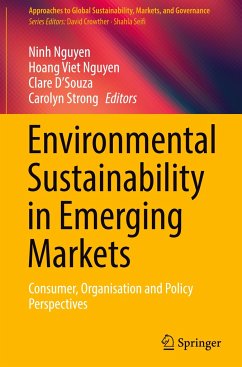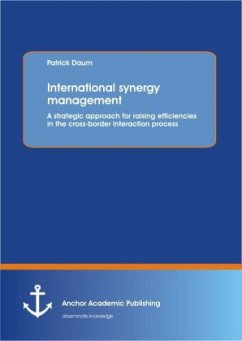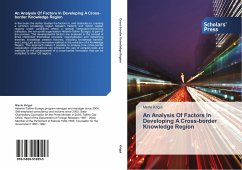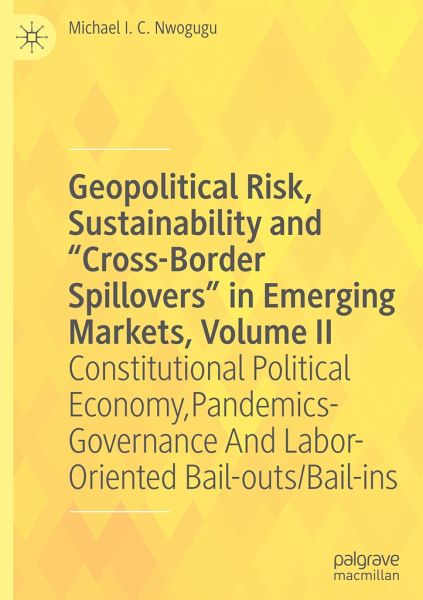
Geopolitical Risk, Sustainability and "Cross-Border Spillovers" in Emerging Markets, Volume II
Constitutional Political Economy, Pandemics-Governance And Labor-Oriented Bail-outs/Bail-ins
Versandkostenfrei!
Versandfertig in 6-10 Tagen
97,99 €
inkl. MwSt.
Weitere Ausgaben:

PAYBACK Punkte
49 °P sammeln!
Many emerging market countries are bank-based economies and are increasingly affected by geopolitical risks, U.S. dollar dynamics, regulations, preferential trade agreements (PTAs), MNCs (that often function like international organizations), social networks, labor dynamics, cross-border spillovers and the inefficient expansion of formal/informal microfinance. Country risks, informal economies (that account for 20-50 percent of the national economy of many emerging market countries), investor protection, enforcement commitment, compliance costs, sustainability (environmental, social, economic ...
Many emerging market countries are bank-based economies and are increasingly affected by geopolitical risks, U.S. dollar dynamics, regulations, preferential trade agreements (PTAs), MNCs (that often function like international organizations), social networks, labor dynamics, cross-border spillovers and the inefficient expansion of formal/informal microfinance. Country risks, informal economies (that account for 20-50 percent of the national economy of many emerging market countries), investor protection, enforcement commitment, compliance costs, sustainability (environmental, social, economic and political sustainability), economic growth, political stability, financial stability, geopolitical risk, social networks, household economics, inequality and international trade outcomes can vary dramatically across many DECs and LDECs due to these phenomena. The COVID-19 pandemic has illustrated the many problems inherent in political systems, economic policy and governments' emergency powersduring pandemics/epidemics and economic/financial crisis.
This second volume focuses on geopolitical risks that are intertwined with constitutional political economy and labor issues, alongside addressing some of the financial and constitutional crises that occurred in Europe, Asia and the U.S. during 2007-2020. This book provides analysis of complex systems and the preferences and reasoning of state/government and corporate actors in order to develop better artificial intelligence and decision-system models of geopolitical risk, public policy and international capital flows, all of which are increasingly important decision factors for investment managers, boards-of-directors and government officials.
This second volume focuses on geopolitical risks that are intertwined with constitutional political economy and labor issues, alongside addressing some of the financial and constitutional crises that occurred in Europe, Asia and the U.S. during 2007-2020. This book provides analysis of complex systems and the preferences and reasoning of state/government and corporate actors in order to develop better artificial intelligence and decision-system models of geopolitical risk, public policy and international capital flows, all of which are increasingly important decision factors for investment managers, boards-of-directors and government officials.





